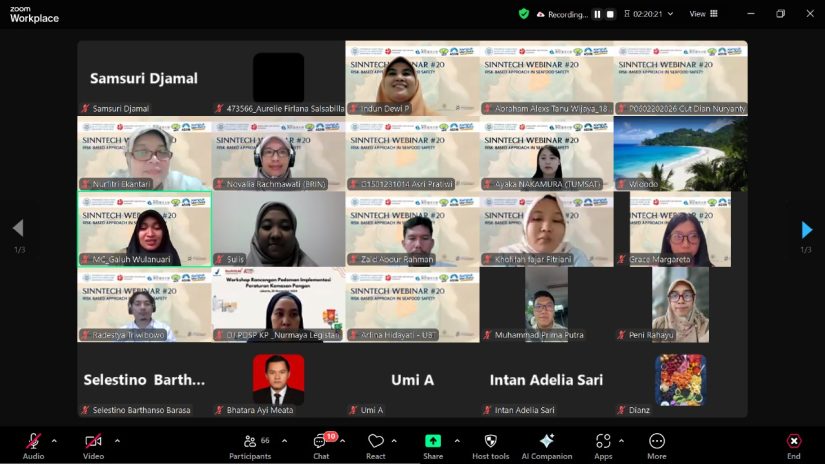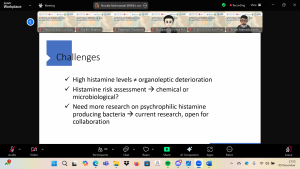
The 20th SinnTech Webinar, held on December 9, 2024, showcased groundbreaking insights under the theme “Risk-Based Approach in Seafood Safety.” This prestigious event featured two esteemed speakers, Novalia Rachmawati, Ph.D., a researcher at the National Research and Innovation Agency of Indonesia (BRIN), and Ayaka Nakamura, Ph.D., a lecturer at Tokyo University of Marine Science and Technology. Moderated by Indun Dewi Puspita, S.P., M.Sc., Ph.D., a fisheries academic, the session delivered invaluable knowledge on managing food safety risks in seafood and food manufacturing industries.
First Presentation regarding Managing Histamine Risks in Indonesian Seafood, Dr. Novalia Rachmawati presented her work on “Managing Histamine Risks in Indonesian Seafood: A Risk-Based Approach.” This session shed light on critical issues surrounding histamine formation and its impact on Indonesia’s seafood sector. Key highlights included understanding histamine, a natural toxin formed from histidine, poses risks when present in levels exceeding international safety standards (100–200 mg/kg depending on the country). In addition, Histamine poisoning (HFP) often resembles allergic reactions, causing symptoms like nausea, rash, and respiratory discomfort. The topic also explains Indonesia’s Seafood Challenges with histamine-related export rejections. Fish such as tuna and tongkol were identified as primary vehicles for histamine poisoning. Case studies revealed histamine levels exceeding permissible limits in processed fish products due to poor handling and temperature abuse. On top of that, Dr. Novalia Rachmawati highlighted a framework combining risk assessment, management, and communication to control histamine formation as a risk-based solution. Practical interventions, such as maintaining low temperatures (10–15°C) and reducing salt levels in fish processing, proved effective in minimizing risks.

Second presentation about monitoring microbial communities in food processing, Dr. Ayaka Nakamura presented her cutting-edge research on “Ensuring Food Safety: Surveillance and Monitoring of Microbial Communities in Food Manufacturing.” The focus was on Japanese Black Beef processing and strategies to extend its shelf life while ensuring microbiological safety. Key takeaways from this research include information for advanced hygiene management by using Amplicon Sequencing Analysis, Dr. Ayaka Nakamura’s team mapped microbial distributions in processing facilities, identifying harmful and non-harmful microbes on carcass surfaces and equipment during different stages of production. Not to mention, the information about tracking contamination sources has been elaborated well. A novel Core Genome MLST Analysis enabled precise identification of bacterial strains, surpassing traditional methods like PFGE and RAPD. This approach improves traceability and data sharing across laboratories. NGS technology facilitated real-time monitoring of microbial shifts, enhancing protocols to mitigate contamination risks. Identified microbes included genera like Pseudomonas and Clostridium, which vary depending on processing conditions. Dr. Nakamura’s work underscores the potential of advanced sequencing technologies in bolstering food safety through early detection and improved hygiene practices.

The webinar also highlighted the enthusiasm of the audience, who actively participated in the Q&A session. Participants engaged in insightful discussions and shared information, further enriching the event’s outcomes. The diverse audience included not only members of Universitas Gadjah Mada but also officials, academics, and students from other institutions. Some attendees even suggested potential main themes for future SinnTech webinars, demonstrating their commitment to the continuity of these valuable forums.
The topics presented in SinnTech #20 align closely with several SDGs, emphasizing their relevance to global sustainability efforts such as SDG 2: Zero Hunger, SDG 3: Good Health and Well-being, SDG 12: Responsible Consumption and Production, and SDG 14: Life Below Water.
Penulis: Galuh Wulanuari
Editor: Dr. Mukti Aprian, S.Kel., M.Si (Han)


